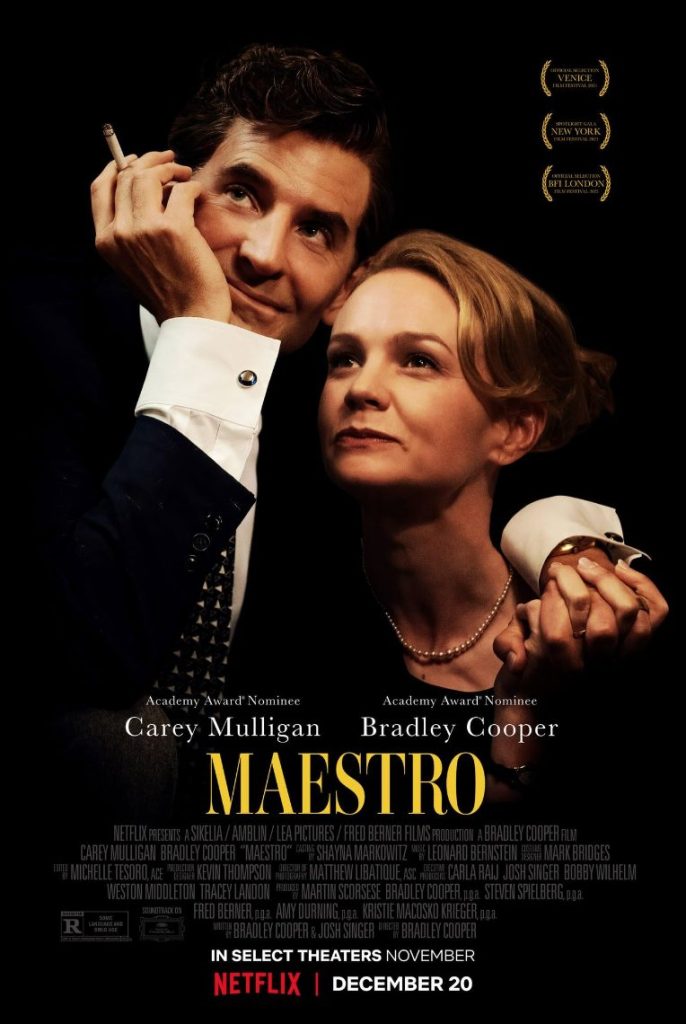 Directed and starred in by the multi-faceted Bradley Cooper, “Maestro” chronicles the intimate and upsetting life of Leonard Bernstein, an innovative conductor/composer whose highs and lows mimicked that of the operas, film scores, and orchestral music he created. Bernstein quickly rose to fame after replacing ailing conductor Bruno Walter on a whim’s notice — and with no rehearsal — to lead the New York Philharmonic orchestra on a live radio broadcast. His exquisite talent led him to become the music director for the New York Philharmonic and later to compose the theatre music for “West Side Story,” among many other accolades. But what Cooper exposes in “Maestro” is the private persona Bernstein hid for years. It is a masterfully-filmed, emotionally sobering look at the way talent, love, and secrets weave tangled webs.
Directed and starred in by the multi-faceted Bradley Cooper, “Maestro” chronicles the intimate and upsetting life of Leonard Bernstein, an innovative conductor/composer whose highs and lows mimicked that of the operas, film scores, and orchestral music he created. Bernstein quickly rose to fame after replacing ailing conductor Bruno Walter on a whim’s notice — and with no rehearsal — to lead the New York Philharmonic orchestra on a live radio broadcast. His exquisite talent led him to become the music director for the New York Philharmonic and later to compose the theatre music for “West Side Story,” among many other accolades. But what Cooper exposes in “Maestro” is the private persona Bernstein hid for years. It is a masterfully-filmed, emotionally sobering look at the way talent, love, and secrets weave tangled webs.
“Maestro” opens with a bang and doesn’t stop during its aesthetically-exquisite two-hour run. From the onset, audiences are treated to a ricochet between black-and-white and Technicolor eras of Bernstein’s life: from his career-defining moments, to his meeting of and marriage to actress Felicia Montealegre (Carey Mulligan), and his years-long affair with San Franciscan Tom Cothran (Gideon Glick).
Montealegre and Bernstein meet at a party in 1947, when Montealegre is just 24. She witnesses Bernstein play the Brahms D minor concerto with the party’s host, and their witty conversation makes it clear that the pair is quickly falling in love. Under Cooper’s direction, audiences see their marriage unfold with a hue that watches as if “Maestro” was made in the ’40s. With dark scenes where the only light comes from a singular bulb, to angelically-lit Central Park scenes and colorful parties in the ’60s and ’70s, each era is captured with a cinematographic flair that alone is a reason to see the film. But underneath all of its beauty, “Maestro” begins to unwind the truth behind their complex and at-times heartbreaking marriage, as Montealegre becomes aware of Bernstein’s bisexuality and its impositions on their marriage, children, and public gossip.
While Bernstein’s and Montealegre’s careers respectively take off, audiences are shown that behind the mirage of success often lies more. In their case, Bernstein begins to have a relationship with young music director Tom Cothran, whose colleagueship is first accepted by the Bernstein family and later exposed as what it is: an extramarital affair that takes a toll on Montealegre’s well-being. In one heart-wrenching scene, Montealegre tells Bernstein that “If you’re not careful, you’re going to die a lonely old queen,” while Macy’s Thanksgiving Day floats wander by their Central Park apartment and their kids knock on the door for them to watch. It is a sadly juxtaposed fight that reveals the cracks in an otherwise beautiful, talented union. What unfolds in the remainder of the film shouldn’t be spoiled, but involves attempts at reconciliation and familial ties that bind Bernstein as much as his egocentric desires for fame do.

With six years of research and one outstanding six-minute scene in which Cooper unselfconsciously plays out Bernstein’s conducting of the London Symphony Orchestra, it’s clear that Cooper and the cast wanted to pay homage as authentically as possible. “Maestro” leaves nothing to the imagination and is sure to be a renowned biopic for this agonized creative genius. It is a heavy, raw look at Bernstein’s life, with the biggest criticism being that it watches at a surface-level with decades of ground to cover. But overall, it is worth seeing if not only to be inspired to live more authentically ourselves. As Bernstein puts it, “I came to realize that as death approaches, an artist must cast off everything that may be restraining him and create in complete freedom. I decided that I had to do this for myself, to live the rest of my life as I want.”
Movie Times: Click Here
Genre: Biopic (Musical/Romance)
Director: Bradley Cooper
Actors: Matt Bomer, Bradley Cooper, Maya Hawke, Carey Mulligan, Sarah Silverman
Runtime: 2 hrs, 9 min
Rating: R (Some Language & Drug Use)




